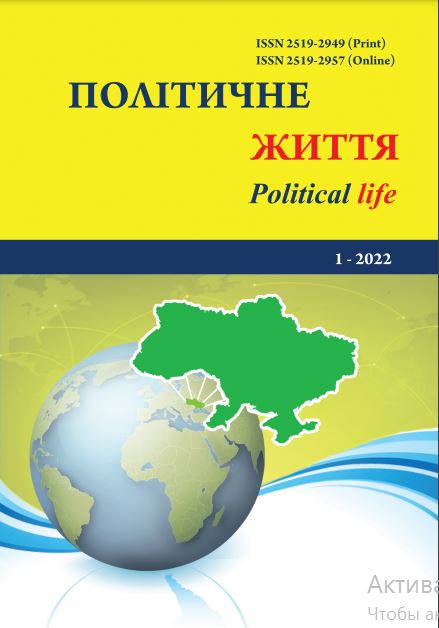Політика ідентичності як чинник міжнародних конфліктів (кейс Нагірного Карабаху)
DOI:
https://doi.org/10.31558/2519-2949.2022.1.13Ключові слова:
Нагірний Карабах; політика ідентичності; націоналізмАнотація
Стаття присвячена аналізу кейсу конфлікту в Нагірному Карабаху і досліджує місце політики ідентичності в процесах його конфліктного менеджменту. В результаті дослідження було зроблено висновок про те, що саме політика ідентичності виступає у якості одного з базових чинників конфлікту, що досліджується, який заважає його врегулюванню і який не враховується державами-учасницями переговорного процесу. Даний чинник виражається у націоналістичній риториці, яка, в цілому, апелює до емоційного стану населення як конфліктуючих держав так і спірних територій, розбудовуючи власну риторику спираючись на трактування історичний подій та явищ, а також культурних особливостей. Ця ситуація робить конфлікт «ірраціональним», мінімізуючи можливості застосування інструментів дипломатії, виключаючи можливість компромісів та підсилюючи вірогідність військового протистояння.
Усвідомлення однозначності позицій сторін конфлікту, їх несхильність до пошуку компромісних рішень виступає у якості «ключа» до вирішення даної проблеми, оскільки потребує зміни підходу до процесу врегулювання. Автором пропонується підхід в межах якого існуючі проблеми та статус-кво переосмислюються в категоріях «минуле-майбутнє» на противагу існуючій логіці «друг-ворог». На практиці даний підхід може бути реалізований шляхом поетапного переосмислення імперативів мислення політичних еліт, які містять конфліктогенну складову і, в довгостроковій перспективі, зміни образу мислення політичних еліт. Даний процес повинен бути забезпечений представниками громадянського суспільства та представниками бізнесу, оскільки перші безпосередньо впливають на формування громадської думки та загальної риторики стосовно проблеми, а другі можуть інтегрувати «раціональну складову» у вирішення даного конфлікту. Підсилення впливу зовнішніх гравців на розвиток даних напрямків (в першу чергу шляхом фінансування спільних вірмено-азербайджанських наукових, культурних, бізнесових, інфраструктурних тощо проєктів) у довгостроковій перспективі може призвести до зміни тих складових національних ідентичностей конфліктуючих сторін, які породжують агресивну риторику. Важливо зазначити, що саме злагоджені дії представників Мінської групи ОБСЄ повинні виступати у якості рушійного механізму цих змін.
Посилання
Пашинян заявил о трудностях с определением статуса Нагорного Карабаха. URL: https://www.interfax.ru/world/812501 (дата звернення: 11.01.2022).
An overview of the current situation. European Movement International. URL: https://europeanmovement.eu/wp-content/uploads/2015/05/2013.09-Current-situation-Nagorno-Karabakh.pdf (дата звернення: 06.11.2021).
Armenian government under attack following war defeat. URL: https://eurasianet.org/armenian-governmentunder-attack-following-war-defeat (дата звернення: 11.01.2022).
Artsakh – Karabakh in 1918-1920. URL: https://armenian-history.com/artsakh-karabakh-in-1918-1920/ (дата звернення: 18.12.2021).
De Waal T. The Nagorny Karabakh Conflict in its Fourth Decade. CEPS Working Document. 2021. № 2. URL: https://www.ceps.eu/wp-content/uploads/2021/09/WD2021-02_The-Nagorny-Karabakh-Conflict-in-its-FourthDecade.pdf (дата звернення: 18.12.2021).
Gahramanova A. Identity conflicts and its implications for conflict management. UNISCI Discussion papers. 2006. №11. P. 153 – 186.
Gorgulu A. The dispute over Nagorno-Karabakh: a protracted conflict. Review of Armenian Studies. 2012. № 25. P. 47 – 66.
Gurbanov I. Karabakh Peace Talks Break Down as Azerbaijan and Armenia Operate at Cross-Purposes. Eurasia Daily Monitor. 2019. Volume: 16 Issue: 29. URL: https://www.academia.edu/39159207/Ilgar_Gurbanov_ Karabakh_Peace_Talks_Break_Down_as_Azerbaijan_and_Armenia_Operate_at_Cross_Purposes_ The_Jamestown_Foundation_2019 (дата звернення: 12.01.2022).
Joint Statement by the Foreign Ministers of Armenia and Azerbaijan and the Co-Chairs of the OSCE Minsk Group. 29 March 2019. URL: https://www.osce.org/minsk-group/415643 (дата звернення: 12.01.2022)
Klever E. The Nagorno-Karabakh conflict between Armenia and Azerbaijan: Post-war Prospects for Nagorno-Karabakh. URL: https://www.crisisgroup.org/europe-central-asia/caucasus/nagorno-karabakhconflict/264-post-war-prospects-nagorno-karabakh (дата звернення: 20.11.2021).
Press Statement by the Co-Chairs of the OSCE Minsk Group. 16 January 2019. URL: https://www.osce.org/minsk-group/409220 (дата звернення: 12.01.2022).
Prykhnenko M. Identity politics and the Nagorno-Karabakh conflict. The XXVI International Science Conference «Topical issues of practice and science», May 18 – 21, 2021, London, Great Britain. P. 614 – 617.
UNHCR publication for CIS Conference (Displacement in the CIS) – Conflicts in the Caucasus. 01 May 1996. URL: https://www.unhcr.org/publications/refugeemag/3b5583fd4/unhcr-publication-cis-conferencedisplacement-cis-conflicts-caucasus.html (дата звернення: 20.11.2021).
Welt C., Bowen A.S. Azerbaijan and Armenia: The Nagorno-Karabakh Conflict. Congressional Research Service. URL: https://sgp.fas.org/crs/row/R46651.pdf (дата звернення: 20.11.2021).
William Zartman I., Anstey M., Meerts P. The Slippery Slope to Genocide: Reducing Identity Conflicts and Preventing Mass Murder. Oxford: Oxford University Press, 2012. 432 p.

